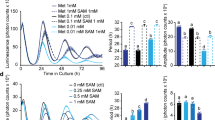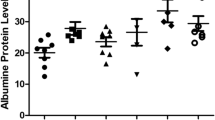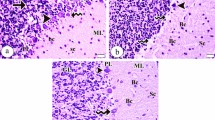Abstract
OUR earlier findings have shown that administration of adenine nucleosides or nucleotides to rats with different experimental porphyrias was followed by a decrease in excess porphyrin formation1–4. These observations have led us to the conclusion that these purine derivatives and particularly ATP play an important part in the quantitative regulation of porphyrin biosynthesis1. Moreover, it occurred to us that if this hypothesis is correct, administration of compounds capable of causing a decrease in the biosynthesis of adenosine triphosphate (ATP) might well bring about the formation of excess porphyrins and porphyrin precursors. Our observations with 6-mercapto-purine3 and orotic acid4 have confirmed this working hypothesis.
This is a preview of subscription content, access via your institution
Access options
Subscribe to this journal
Receive 51 print issues and online access
$199.00 per year
only $3.90 per issue
Buy this article
- Purchase on Springer Link
- Instant access to full article PDF
Prices may be subject to local taxes which are calculated during checkout
Similar content being viewed by others
References
Gajdos, A., Bull. Soc. Chim. Biol., 45, 1227 (1963).
Gajdos, A., and Gajdos-Török, M., Nature, 206, 297 (1965).
Gajdos, A., and Gajdos-Török, M., C.R. Soc. Biol., 157, 255 (1963).
Gajdos, A., and Gajdos-Török, M., C.R. Soc. Biol., 159, 33 (1965).
Shull, K. H., J. Biol. Chem., 237, PC, 1734 (1962).
Stekol, J. A., Mody, U., Bedrak, E., Keller, S., and Perry, J., Fed. Proc., 19, 37 (1960).
Villa-Trevino, S., Shull, K. H., and Farber, E., J. Biol. Chem., 238, 1757 (1963).
Gibson, K. P., Neuberger, A., and Tait, G. H., Biochem. J., 83, 550 (1962).
Strehler, B. L., and MacElroy, W. D., in Methods in Enzymology, edit. by Colowick, S. P., and Kaplan, N. O. (Academic Press, London, 1957).
Granick, S., and Urata, G., J. Biol. Chem., 238, 821 (1963).
Hutterer, F., Fischen, W., and Popper, H., Brit. J. Exp. Pathol., 42, 187 (1961).
Granick, S., J. Biol. Chem., 238, 2247 (1963).
Farber, E., Shull, K. H., Villa-Trevino, S., Lombardi, B., and Thomas, M., Nature, 203, 34 (1964).
Weber, G., et al., cited by Turner, M. K., and Reid, E., Nature, 203, 1174 (1964).
Gajdos, A., and Gajdos-Török, M., Bull. Soc. Chim. Biol., 45, 857 (1963).
Gajdos, A., and Gajdos-Török, M., C. R. Soc. Biol., 156, 258 (1962).
Gajdos, A., and Gajdos-Török, M., Nature, 207, 640 (1965).
Author information
Authors and Affiliations
Rights and permissions
About this article
Cite this article
PALMA-CARLOS, A., PALMA-CARLOS, L., GAJDOS-TÖRÖK, M. et al. Experimental Porphyria induced in Rats by Ethionine. Nature 211, 977–978 (1966). https://doi.org/10.1038/211977a0
Issue Date:
DOI: https://doi.org/10.1038/211977a0
Comments
By submitting a comment you agree to abide by our Terms and Community Guidelines. If you find something abusive or that does not comply with our terms or guidelines please flag it as inappropriate.



